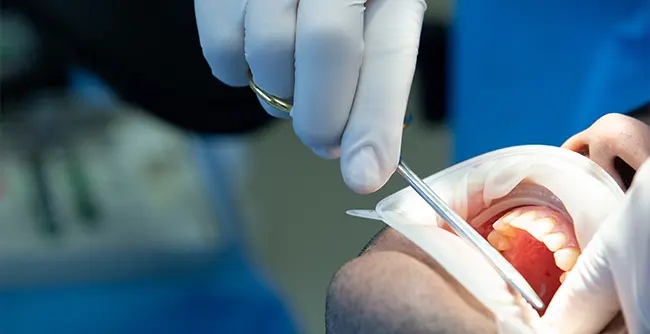
Oral Surgery
We are here to help when you need us.

Oral surgery, also known as oral and maxillofacial surgery, is a dental specialty that focuses on the diagnosis and surgical treatment of various conditions, diseases, and injuries related to the mouth, jaw, face, and neck. Oral surgeons are highly trained dental professionals who perform a wide range of surgical procedures, from routine tooth extractions to complex surgical interventions. Here are some key aspects of oral surgery:
1. Tooth Extractions:** One of the most common procedures performed by oral surgeons is tooth extraction. This can include the removal of impacted wisdom teeth, severely damaged or decayed teeth, or teeth that need to be extracted for orthodontic treatment.
2. Dental Implants:** Oral surgeons are often responsible for placing dental implants. These are artificial tooth roots made of titanium that are surgically inserted into the jawbone to support replacement teeth (crowns, bridges, or dentures).
3. Orthognathic Surgery:** This type of surgery is used to correct severe jaw misalignments (malocclusions) that may result in problems with biting, chewing, speaking, or breathing. Orthognathic surgery involves repositioning the upper and lower jaws to improve both function and facial aesthetics.
4. Oral Pathology:** Oral surgeons diagnose and treat conditions related to the soft and hard tissues of the mouth and face. This may include the removal of oral tumors, cysts, or other abnormal growths.
5. Temporomandibular Joint (TMJ) Surgery:** Oral surgeons can address disorders of the temporomandibular joint, which can cause jaw pain, headaches, and difficulty with jaw movement.
6. Facial Trauma:** Oral and maxillofacial surgeons are often involved in the treatment of facial injuries resulting from accidents, falls, or assaults. They can repair facial fractures, lacerations, and damaged teeth.
7. Cleft Lip and Palate Repair:** Oral surgeons may perform surgical procedures to correct cleft lip and palate conditions in both children and adults.
8. Obstructive Sleep Apnea Surgery:** For patients with obstructive sleep apnea, oral surgeons may offer surgical interventions to address anatomical obstructions in the upper airway.
9. Biopsies:** When there are oral lesions or suspicious growths, oral surgeons may perform biopsies to determine if they are cancerous or benign.
10. Pre-Prosthetic Surgery:** Some patients may require surgical procedures to prepare the mouth for the successful placement of dentures or other prosthetic devices.
Oral surgeons work closely with other healthcare professionals, including dentists, orthodontists, and medical specialists, to provide comprehensive care for their patients. These specialists receive extensive training, including dental and medical education, and often complete residencies in oral and maxillofacial surgery.
If you require oral surgery, your general dentist may refer you to an oral surgeon for evaluation and treatment. The specific surgical procedure chosen will depend on your individual needs and the complexity of your condition. It's essential to consult with a qualified oral and maxillofacial surgeon to discuss your treatment options and address any concerns you may have.








